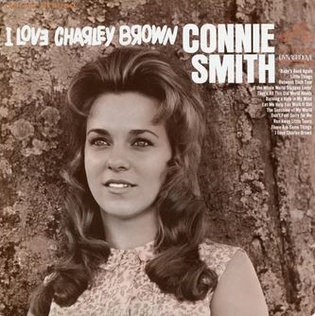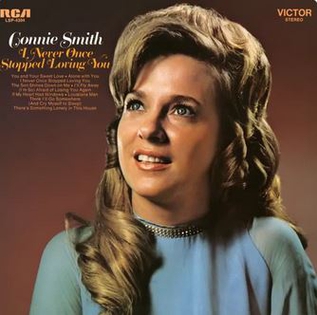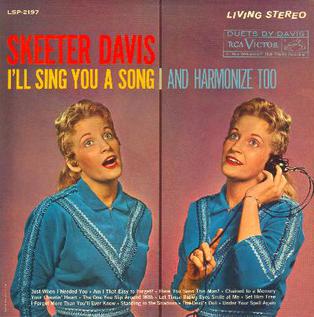Related Research Articles

Skeeter Davis was an American country music singer who sang crossover pop music songs including 1962's "The End of the World". She started out as part of the Davis Sisters as a teenager in the late 1940s, eventually landing on RCA Victor. In the late 1950s, she became a solo star.

Mickey & Sylvia was an American R&B duo composed of Mickey Baker and Sylvia Vanderpool, who later became Sylvia Robinson. They are best known for their number-one R&B single "Love Is Strange" in 1957.

Cute 'n' Country is the second studio album by American country music artist Connie Smith. It was released in October 1965 via RCA Victor Records and contained 12 tracks. Cute 'n' Country contained a mixture of original songs and cover versions by other country artists. Featured on the album was the top ten single "I Can't Remember". Cute 'n' Country was Smith's second album to top the Billboard country LP's chart.
"Silver Threads and Golden Needles" is a song written by Dick Reynolds and Jack Rhodes. It was first recorded by Wanda Jackson in 1956. The original lyrics, as performed by Jackson, contain a verse not usually included in later versions, which also often differed in other minor details.

The discography of American country artist Skeeter Davis contains 32 studio albums, 18 compilation albums, 59 singles, 53 lead singles, six collaborative singles, two other charted songs and two additional appearances. Davis was first one half of the duo, The Davis Sisters before embarking on a solo career with the RCA Victor label. Her second single was 1957's "Lost to a Geisha Girl", which reached the top 15 of the American Billboard Hot Country Songs chart. It was followed in 1959 by the top five country selection, "Set Him Free". The same year, Davis's debut studio album was issued on RCA Victor titled I'll Sing You a Song and Harmonize Too. Her career momentum continued to build in 1960 with two top five back-to-back singles: "(I Can't Help You) I'm Falling Too" and "My Last Date ". Both selections also climbed into the Billboard Hot 100 top 40. They were featured on Davis's second studio album called Here's the Answer. Between 1961 and 1962, Davis had top ten Billboard country singles with "Optimistic" and "Where I Ought to Be".

I Love Charley Brown is the tenth studio album by American country singer Connie Smith. It was released in April 1968 via RCA Victor and featured 12 tracks. The album reached the top 20 of the American country albums chart. It was described as a collection of pop-inspired country songs. Included were four cuts written by Smith's longtime songwriting collaborator, Dallas Frazier. Among his cuts was one of the album's three singles, "Run Away Little Tears". Along with Frazier's cut, the two additional singles included reached the top ten of the American country songs chart. The album was met with favorable reviews from critics.

The Best of Connie Smith Volume II is a compilation album by American country singer Connie Smith. It was released in March 1970 via RCA Victor and contained ten tracks. It was the second "Best Of" compilation released by the RCA Victor label that featured Smith's musical output. The disc compiled Smith's most popular singles between 1967 and 1969. The album reached the top 30 of the American country albums chart following its release. Also included was two new recordings. Of these new recordings, one was released as a single in 1969. Titled "You and Your Sweet Love", it reached the top ten of the country singles chart.

I Never Once Stopped Loving You is a fourteenth solo studio album by American country singer Connie Smith. It was released in September 1970 on RCA Victor and contained ten tracks. The collection mixed original material with covers of previously-recorded songs. Three singles were included on the album: "You and Your Sweet Love", the title track and "Louisiana Man". Both "You and Your Sweet Love" and the title track reached the top ten on the American country songs chart in 1970. The album itself charted in the top 20 of the American country LP's survey. Billboard magazine gave the LP a positive response following its original release.

I'll Sing You a Song and Harmonize Too is the debut studio album by American country artist Skeeter Davis. The album was released in November 1959 by RCA Victor and was produced by Chet Atkins. It signified Davis' first solo album ever released after departing from the duo, The Davis Sisters.

Here's the Answer is the second studio album by American country artist Skeeter Davis. The album was released in January 1961 on RCA Victor Records and was produced by Chet Atkins. The album consisted of cover versions of hit singles by country artists and answer songs to the hits.

The End of the World is the fourth studio album by American country singer Skeeter Davis. It was released in March 1963 by RCA Victor. It includes the hit single "The End of the World", which peaked at number two on the Billboard Hot 100 pop chart.
"Lost to a Geisha Girl" is a song written by Lawton Williams. It was recorded and released as a single by American country artist, Skeeter Davis, in 1957.
"Set Him Free" is a song written by Skeeter Davis, Helen Moyer, and Marie Wilson. In 1959, Skeeter Davis recorded and released the song as a single for RCA Victor.
"(I Can't Help You) I'm Falling Too" is a song written by Hal Blair, Skeeter Davis, and Don Robertson. In 1960, Skeeter Davis recorded and released the song as a single for RCA Victor. It was an answer song to Hank Locklin's major country pop crossover hit entitled, "Please Help Me, I'm Falling". It was Davis' second answer song in response to a Locklin tune.
"My Last Date " is a song written by Boudleaux Bryant, Floyd Cramer, and Skeeter Davis. In 1960, Skeeter Davis recorded and released the song as a single for RCA Victor. The song was an answer song to Floyd Cramer's country pop crossover hit that year titled "Last Date". Skeeter Speaks the first two lines in the Bridge section of the song.
"Where I Ought to Be" is a song written by Harlan Howard. In 1961, Skeeter Davis recorded and released the song as a single for RCA Victor in 1962.

"I Can't Stay Mad at You" is a song written by Gerry Goffin and Carole King. It was originally recorded by American country artist Skeeter Davis, becoming her second top-ten hit on the Billboard Hot 100 in 1963. "I Can't Stay Mad at You" followed on the popular success of Davis' earlier 1963 crossover hit "The End of the World". The song was one of the first Goffin-King compositions to be recorded by a country music performer.

"The Country Hall of Fame" is a song written by Karl Davis that was originally recorded by American country singer–songwriter Hank Locklin. It was released as a single in 1967 and became a top ten hit on the American country chart the following year. It was Locklin's first major hit in several years and would be released on an album of the same name.
"Tiny Blue Transistor Radio" is a song written by Bill Anderson that was originally recorded by American country music singer Connie Smith. It was released as the B-side to her 1965 single, "Then and Only Then". "Tiny Blue Transistor Radio" also became a charting country single, peaking within the top 40 of the national country survey in 1965.
References
- 1 2 3 Unterberger, Richie. "Blueberry Hill: Songs, reviews, credits". AllMusic . Retrieved 20 September 2022.
- 1 2 Whitburn, Joel (2008). Hot Country Songs 1944 to 2008. Record Research, Inc. ISBN 0-89820-177-2.
- ↑ Unterberger, Richie. "Skeeter Davis Biography". AllMusic . Retrieved 20 September 2022.
- 1 2 3 Davis, Skeeter (July 1962). ""The Little Music Box"/"The Final Step" (7" vinyl single)". RCA Victor . 47-8055.
- ↑ "Skeeter Davis Chart History (Hot Country Songs)". Billboard. Retrieved September 20, 2022.